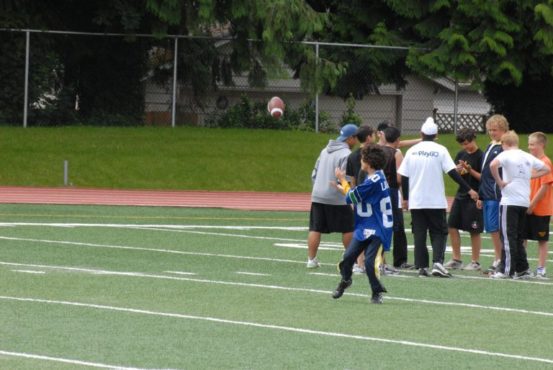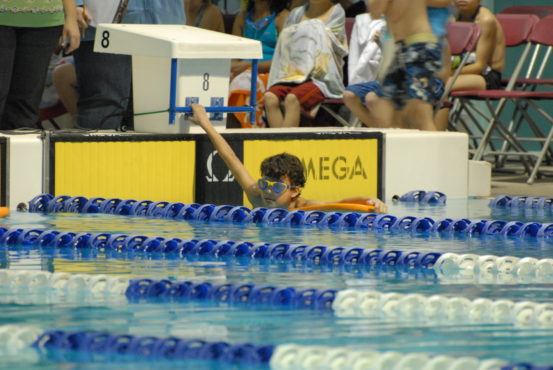Parents pushing their kids to be the next ‘Connor McDavid’ or ‘Christine Sinclair’ put too much pressure on youth’s shoulders

Our writer, Josh Kozelj, playing one sport while wearing the jersey of another sport. Photo provided
For the past four summers, I have seen the dark side of youth sport first-hand.
I have been witness to the greed, hunger, and self-indulgence of parents who unnecessarily push their children to become youth prodigies at ages when they should be playing sport for the love of the game.
First, however, let me give you some insight into my history in athletics.
I grew up as that kid that would bounce from practice to practice before and after school. A typical schedule in my early years of high school would be: swimming practice at 6 a.m., school from 8:45–3:05 p.m., basketball practice at 3:15 p.m., and then a track workout at 5 p.m.
I’d then repeat that process four more times a week.
Today, I run varsity track and cross country for the Vikes, but running was not the sport I saw myself pursuing when I was a child.
As a kid, I dreamt of playing running back in the National Football League, but after playing one year of football I realized my six-foot,140-pound body isn’t conducive to such an aggressive sport. I opted instead to pursue basketball.
After a few years of competitive middle and high school basketball, our coach realized how much faster I was running up and down the court than everyone else.
So, he told me that every time the opposing team shot the ball, instead of trying to grab a rebound, to sprint towards the opponent’s hoop and look for one of my teammates to throw the ball to me as I outran the other team.
It wasn’t until the spring of my grade 10 year, when I realized that running could help me attend university and compete in sport past the high school level, that I fully committed to one sport.
But most kids that I see today are pushed by their parents to make the decision to focus on one sport at a much younger age.
Because the chances are so slim that young athletes will reach the pros, parents and coaches need to ensure the number one goal of youth sport is that kids have fun.
Since the summer of 2014, I have been a volunteer track and field coach for my hometown club, the Coquitlam Cheetahs, and I would see one of two things for my Junior Development athletes (aged nine to 13).
I would see a parent standing with their arms crossed watching to critique the workouts I gave my young athletes, or a parent taking their kid out of track practice early to attend hockey practice, in the middle of July.
Now, I applaud certain parents for encouraging their kids to play other sports, but why must a child focus on hockey during the dog days of summer?
In our country, where hockey is known as ‘Canada’s sport’, I see a troubling trend of parents forcing their kids to practice one sport all months of the year in hopes of seeing their child skate in the NHL.
The specific term for this phenomenon is dubbed ‘adultifying,’ where the dreams of children are being replaced with the ambitions of adults.
North Vancouver native Matt Young, who is a fitness company innovator and was recently named to the U.S. Olympic Committee as the man to produce its athlete development model, sees this as a troubling trend.
“The adultification of sports has left out who it’s supposed to serve — those young men and women,” Young said in an interview with The Province. “Six per cent of high school athletes go on to play in college. Maybe two per cent of those go on to a professional career. If you ask any parent, I’d say 99 per cent think they’re that two per cent.”
With 713 roster spots in the NHL and 1 696 in the NFL, only a select number of athletes will graduate to the professional ranks. And although those two numbers may seem pretty large, with millions of high school athletes competing in sport across the country, few young athletes will actually reach the professional ranks.
Because the chances are so slim that young athletes will reach the pros, parents and coaches need to ensure the number one goal of youth sport is that kids have fun.
In a scary collection of data, a 2016 U.S. poll found that 70 per cent of kids stop playing organized sport by the age of 13, mostly because ‘it’s not fun anymore.’ As someone who works with kid in sport, this stat is extremely frightening.
Yes, I want them to give their all, but at the same time, I realize fostering friendships and having fun is key to youth sports.
Playing multiple sports in my youth not only gave me an athletic foundation and a place to learn the rules of other sports, but it was an opportunity to build lifelong friendships with teammates from basketball, swimming, and football.
Parents need to realize their adultification will not increase the odds of their children becoming professional athletes, but it instead prevents them from playing sport purely for the love of the game.








